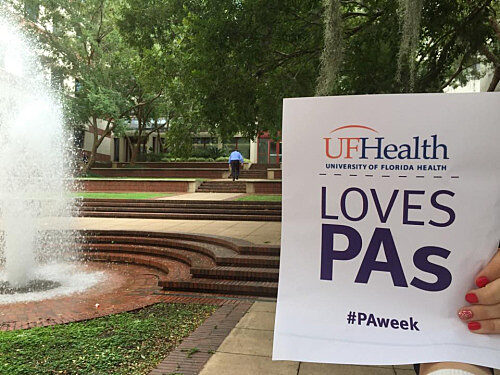Know your healthcare providers: What is a Physician Assistant?

As the country’s patient population grows and patient needs evolve, health care organizations are adding more support for patients with physician assistants, nationally certified and state-licensed medical professionals.
Physician assistants are an important part of the health care team, supporting physicians, nurses and other health care providers. Pas, who hold a Master’s Degree, have experience as EMTs, nurses or paramedics, and have passed the Physician Assistant-Certified designation, can provide an assortment of services for patients, including developing treatment plans, ordering and interpreting tests, diagnosing and treating illnesses, conducting physical exams and prescribing medication.
How much do you know about physician assistants? Shalon Buchs, M.H.S., PA-C, associate director and assistant professor in the School of Physician Assistant Studies, shares some insights into this growing field of medical professionals.
What is the one thing you want people to know about PAs?
I want the community to know that PAs are an integral part of the health care team, and we work in collaboration with physicians and other members of the team. We’re well educated and qualified to take care of patients. We see patients regularly; patients probably see PAs and don’t even know it.
It’s increasingly important that patients and health care providers alike are educated on who PAs are and what we’re capable of providing. PAs can be found in almost every practice setting: primary care, the emergency department, the operating room, dermatology practice, etc. Much like nurse practitioners, PAs evaluate patients, take their histories, conduct physical exams, order testing, come up with working diagnoses and even prescribe medication. And there may or may not be a physician present with them at that time.
What’s a good day on the job for you?
I often see patients in the Mobile Outreach Clinic. In that role, I sometimes work with PA students and medical students. We get to see patients who otherwise don’t have access to health care. It’s very rewarding to see patients who are truly in need. So is having a medical or PA student with me and be able to teach him or her something during that encounter.
From an education standpoint, it’s always a good day when you see a student kind of “get it”; when you see a light bulb go off, or when he comes back and tell you he were able to put something he learned in the classroom into practice. It’s rewarding to see the success of a student or to hear back that she got the job or is now training somebody else. They’re helping the patients they hoped to help.
What do you find most rewarding about your profession?
Interacting with patients and watching students grow is extremely rewarding. From a clinical perspective, I enjoy interacting with patients and continuing to learn, because medicine changes over time.
What does PA week mean to you?
As a young profession in the health care system, I think spreading the word about PAs is one of the most important pieces of PA week.
How is UF Health helping to train the next generation of physician assistants?
As this profession has grown, we have answered the call. The PA profession started out as a certificate or an associate degree, and we’ve grown to a master’s level profession. We train in the medical model, and at the University of Florida we’re located in the same building as the medical school: the Harrell Medical Education Building. We’re very well respected in the medical school.
As with any team, more practice — or, for our purposes, learning — will result in a more productive, better functioning team. With PA students and medical students in the same building at UF, interacting on a daily basis, our students begin their journey as medical providers in a building that promotes the framework for the physician-PA team. UF is one of few schools in the United States that has a PA program in which that’s happening, so I think that’s a big deal. This is the foundation that the students will ultimately build from throughout their careers.
Learn more about how the UF College of Medicine's School of Physician Assistant Studies is training the next generation of physician assistants.